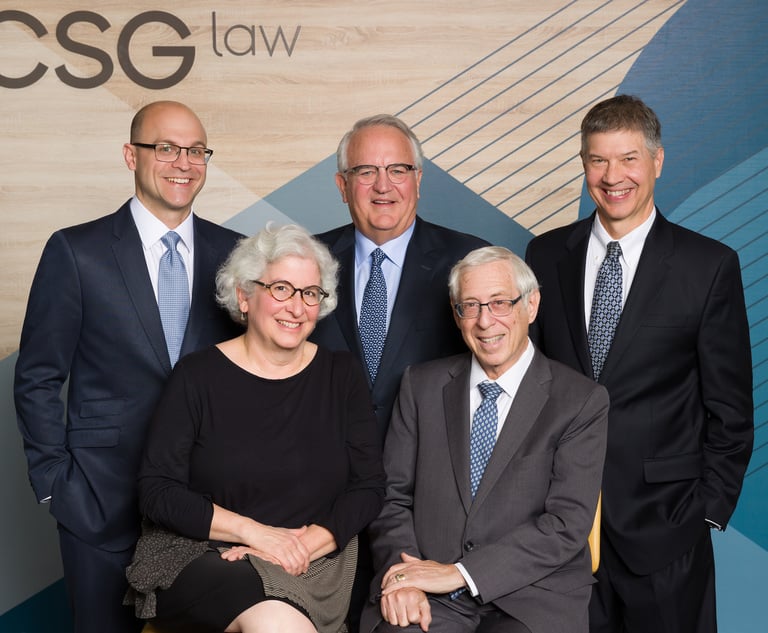BAR REPORT - NJSBA Board of Trustees update
NJSBA trustees focus on legislation
November 30, 2020 at 08:00 AM
2 minute read
The New Jersey State Bar Association Board of Trustees took action on several measures at its recent meeting.
The governing body met virtually on Nov. 20 and voted to support several pieces of pending legislation.
The legislation included:
|- A-4288 (Vainieri Huttle)/S-2545 (Singleton) would establish certain requirements concerning rights of lesbian, gay, bisexual, transgender, undesignated/non-binary, questioning, queer, intersex and HIV-positive residents of long-term care facilities. Specifically, the bill provides that it will be prohibited for a long-term care facility, or for staff at the facility, to take certain actions based in whole or in part on a person's actual or perceived sexual orientation, gender identity, gender expression, intersex status or human immunodeficiency virus status.
- A-3617 (Quijano), would require actions to recover certain residential tenancy security deposits be heard in the county in which the rental property in dispute is located.
- A-3620 (Quijano) would require inclusion of information about discriminatory housing practices in the Truth-in-Renting Guide. The bill would require the Department of Community Affairs to include information that it is discriminatory and unlawful for a landlord: to refuse to rent to a person who would be paying with a housing voucher or other lawful rental subsidy and to advertise that the landlord will not rent to persons with a housing voucher or another lawful rental subsidy. The bill would also require the department to include information in the Truth-in-Renting Guide indicating that state and federal rental housing vouchers are considered a source of lawful income, which is a protected category under the Law Against Discrimination, and, therefore, it is unlawful for a landlord to refuse to rent to persons who would pay with these rental subsidies.
- A-1032 (Downey)/S-758 (Gopal) would require workers' compensation judges to be enrolled in the Public Employees' Retirement System of Workers' Compensation Judges of the Division of Workers' Compensation in the Department of Labor and Workforce Development as a condition of employment for service as a judge of compensation. This would apply to each judge enrolled after the effective date of the bill. Currently, workers' compensation judges are enrolled in the Defined Contribution Retirement Program or the Workers' Compensation Judges Part of the Public Employees' Retirement System.
The board also approved a proposal to update the bylaws of the Elder and Disability Law Section to affirmatively state that the section will work to actively encourage more diverse and inclusive participation and update aspects of its nominations process.
This content has been archived. It is available through our partners, LexisNexis® and Bloomberg Law.
To view this content, please continue to their sites.
Not a Lexis Subscriber?
Subscribe Now
Not a Bloomberg Law Subscriber?
Subscribe Now
NOT FOR REPRINT
© 2024 ALM Global, LLC, All Rights Reserved. Request academic re-use from www.copyright.com. All other uses, submit a request to [email protected]. For more information visit Asset & Logo Licensing.
You Might Like
View All
Appellate Div. Follows Fed Reasoning on Recusal for Legislator-Turned-Judge
4 minute read
Chiesa Shahinian Bolsters Corporate Practice With 5 From Newark Boutique
5 minute read
'A Mockery' of Deposition Rules: Walgreens Wins Sanctions Dispute Over Corporate Witness Allegedly Unfamiliar With Company
Trending Stories
Who Got The Work
Michael G. Bongiorno, Andrew Scott Dulberg and Elizabeth E. Driscoll from Wilmer Cutler Pickering Hale and Dorr have stepped in to represent Symbotic Inc., an A.I.-enabled technology platform that focuses on increasing supply chain efficiency, and other defendants in a pending shareholder derivative lawsuit. The case, filed Oct. 2 in Massachusetts District Court by the Brown Law Firm on behalf of Stephen Austen, accuses certain officers and directors of misleading investors in regard to Symbotic's potential for margin growth by failing to disclose that the company was not equipped to timely deploy its systems or manage expenses through project delays. The case, assigned to U.S. District Judge Nathaniel M. Gorton, is 1:24-cv-12522, Austen v. Cohen et al.
Who Got The Work
Edmund Polubinski and Marie Killmond of Davis Polk & Wardwell have entered appearances for data platform software development company MongoDB and other defendants in a pending shareholder derivative lawsuit. The action, filed Oct. 7 in New York Southern District Court by the Brown Law Firm, accuses the company's directors and/or officers of falsely expressing confidence in the company’s restructuring of its sales incentive plan and downplaying the severity of decreases in its upfront commitments. The case is 1:24-cv-07594, Roy v. Ittycheria et al.
Who Got The Work
Amy O. Bruchs and Kurt F. Ellison of Michael Best & Friedrich have entered appearances for Epic Systems Corp. in a pending employment discrimination lawsuit. The suit was filed Sept. 7 in Wisconsin Western District Court by Levine Eisberner LLC and Siri & Glimstad on behalf of a project manager who claims that he was wrongfully terminated after applying for a religious exemption to the defendant's COVID-19 vaccine mandate. The case, assigned to U.S. Magistrate Judge Anita Marie Boor, is 3:24-cv-00630, Secker, Nathan v. Epic Systems Corporation.
Who Got The Work
David X. Sullivan, Thomas J. Finn and Gregory A. Hall from McCarter & English have entered appearances for Sunrun Installation Services in a pending civil rights lawsuit. The complaint was filed Sept. 4 in Connecticut District Court by attorney Robert M. Berke on behalf of former employee George Edward Steins, who was arrested and charged with employing an unregistered home improvement salesperson. The complaint alleges that had Sunrun informed the Connecticut Department of Consumer Protection that the plaintiff's employment had ended in 2017 and that he no longer held Sunrun's home improvement contractor license, he would not have been hit with charges, which were dismissed in May 2024. The case, assigned to U.S. District Judge Jeffrey A. Meyer, is 3:24-cv-01423, Steins v. Sunrun, Inc. et al.
Who Got The Work
Greenberg Traurig shareholder Joshua L. Raskin has entered an appearance for boohoo.com UK Ltd. in a pending patent infringement lawsuit. The suit, filed Sept. 3 in Texas Eastern District Court by Rozier Hardt McDonough on behalf of Alto Dynamics, asserts five patents related to an online shopping platform. The case, assigned to U.S. District Judge Rodney Gilstrap, is 2:24-cv-00719, Alto Dynamics, LLC v. boohoo.com UK Limited.
Featured Firms
Law Offices of Gary Martin Hays & Associates, P.C.
(470) 294-1674
Law Offices of Mark E. Salomone
(857) 444-6468
Smith & Hassler
(713) 739-1250







